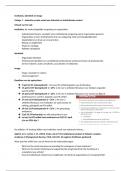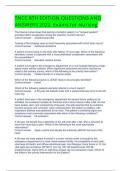Summary
Samenvatting & uitwerkingen van 2 oefenopdrachten - Instituties, identiteit en imago (S_III)
- Course
- Institution
Dit is een uitgebreide samenvatting van college 1 t/m college 11. Het omvat alle stof die je nodig hebt om de opdrachten te maken. Ook is er duidelijk wat de richtlijnen van de opdrachten is, en zijn er 2 uitwerkingen/voorbeelden van de opdrachten om inspiratie op te doen.
[Show more]




